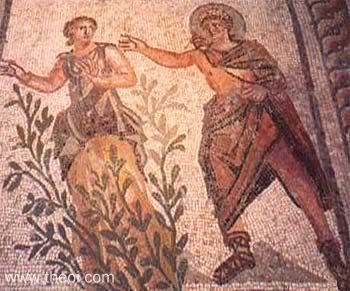




Labels: arcadia
PG Wodehouse, Jeeves in the Offing: The Jeeves Omnibus 4, p.242'And you may possibly not believe me, but I find the prospect of searching Mr. Cream's room quite enjoyable.''Enjoyable?''Yes. In a curious way it restores my youth. It brings me back to my preparatory school days, when I would often steal down at night to the headmaster's study to eat his biscuits.'I started. I looked at him with a kindling eye. Deep had called to deep, and the cockles of the heart were warmed.'Biscuits?'He kept them in a tin on his desk.''You really used to do that at your prep school?''Many years ago.'So did I, I said, coming within an ace of saying, 'My brother!''Indeed? Fancy that! I had supposed the idea original with myself, but no doubt all over England today the rising generation is doing the same thing. So you too have lived in Arcady? What kind of biscuits were yours? Mine were mixed.'
Labels: arcadia




Pseudo-Hyginus, Fabulae 203 (trans. Grant) (Roman mythographer C2nd A.D.) :"When Apollo was pursuing the virgin Daphne, daughter of the river Peneus, she begged for protection from Terra [Gaia], who received her, and changed her into a laurel tree. Apollo broke a branch from it and placed it on his head."
If Daphne is suffering a transformation so too is the god. We see in the expression of his eyes - how well the painter has capture it!- the desperation and dawning anguish of one about to experience loss, not only of this ravishing girl who is the object of his desire but along with her an essential quality of selfhood, of what up to this he believed was and now knows he will not be again. His sinewed hand that reaches out to grasp his quarry will never find its hold. Already Daphne is becoming leaf and branch; when we look closely we see the patches of bark already appearing through her skin, her slender fingers turning to twigs, her green eyes blossoming.
Und ich bringe Dir dieses zum Gedächtnis und als Erinnerung, das eine und das andere zugleich, das eine im anderen, und wir haben vielleicht in der Ökonomie dieser beiden Worte das ganze Gesetz des Archivs: der Liebe Deines Vaters, der dich ewig liebt.And I have presented it to you as a memorial and as a reminder, the one in the other, and we have, perhaps, in the economy of these two words the whole of archival law: of love from your father, who loves you with everlasting love.Jakob son of R. Shelomoh Freid [sic] In the capital city Vienna 29 Nisan [5]651 6 May 1891
Jacques Derrida, Dem Archiv verschrieben, Berlin, Brinkman & Bose, 1997, p.47
Labels: arcadia
What, then, is the literal sense of this phrase? As was mentioned at the beginning, we are now inclined to translate it as 'I, too, was born, or lived, in Arcady.' That is to say, we assume that the et means 'too' and refers to ego, and we further assume that the unexpressed verb stands in the past tense; we thus attribute the whole phrase to a defunct inhabitant of Arcady. All these assumptions are incompatible with the rules of Latin grammar. The phrase Et in Arcadia ego is one of those elliptical sentences like Summum jus summa iniuria, E pluribus unum, Nequid nimis or Sic semper tyrannis, in which the verb has to be supplied by the reader. [...]The correct translation of the phrase in its orthodox form is, therefore, not 'I, too, was born, or lived, in Arcady', but: 'Even in Arcady there am I', from which we must conclude that the speaker is not a deceased Arcadian shepherd or sheperdess but Death in person.
Labels: arcadia
Paradies n. paradis[e] ... ist entlehnt aus spl. paradisus, dieses aus gr. paradeisos (auch: 'Park'), das auf ein iranisches Wort zurueckgeht (avest. pairi-daeza 'Umwallung', apers. paridaida 'Lustgarten, Wildpark'). Das Wort kommt ins griechische, weil Xenophon es fuer die Bezeichnung der Parks persischer Adliger und Koenige gebraucht. In der griechischen Bibel (Septuaginta) wird das Wort dann fuer den 'Garten Eden' gebraucht, wodurch es zu einem Terminus der christlichen Mythologie wird.
Kluge Etymologisches Woerterbuch der deutschen Sprache, 612.
The word Paradise stems from the the Greek term paradeisos (Park) which relates back to an Iranian word pairi-daeza (enclosed garden or park). The word enters into Greek through Xenophon who uses it to to denote the parks of Persian nobility and royalty. In the Greek bible (Septuagint) the word is then used for the 'Garden Eden' and hence makes it a term of Christian mythology.
Labels: arcadia
In diesem Landhaus bin ich, nachdem Adela von Gerald erfahren hatte, dass ich ganz ohne Eltern und Anverwandte war, wiederholt, ja eigentlich staendig eingeladen gewesen und ich wuensche mir heute, sagte Austerlitz, dass ich in dem Frieden, der dort ununterbrochen herrschte, spurlos haette vergehen koennen.
Sebald, Austerlitz, 119.
Once Adela had discovered from Gerald that I had no parents or any family at all, I was invited to their house repeatedly, indeed constantly and I could wish now, said Austerlitz, to have vanished without a trace in the peace that always reigned there.
Sebald, Austerlitz, 111.
Labels: arcadia

Labels: arcadia
ET IN ARCADIA EGO. The first time I encountered this phrase was not in a pastoral painting or poem, but as an object in Evelyn Waugh's Brideshead Revisited. It was inscribed across the pate of the skull that sat in ostentatious splendor in Charles Ryder's Oxford rooms. When the great art historian Erwin Panofsky came to write his article on the two meanings of the classical motto, he congratulated Waugh for both grasping and exploiting its ambiguity. For who, exactly, was the "I" in "And I too was in Arcady"? Read innocently, the tomb inscription discovered by Poussin's shepherds seems to be a wistful epitaph for a pastoral idyll enjoyed and then lost. The monstrous skull in Guernico's earlier version, though, was unequivocal in its declaration that "even in Arcady, I, Death, am present." The cunning of Waugh's conceit is to lure the reader into assuming that Ryder's revisitation of Brideshead speaks an elegy for a golden agen when in fact it turns into a long graveside oration for the death of faith, love, dynasty, England itself.
S. Schama, Landscape and Memory, 519.
Labels: arcadia